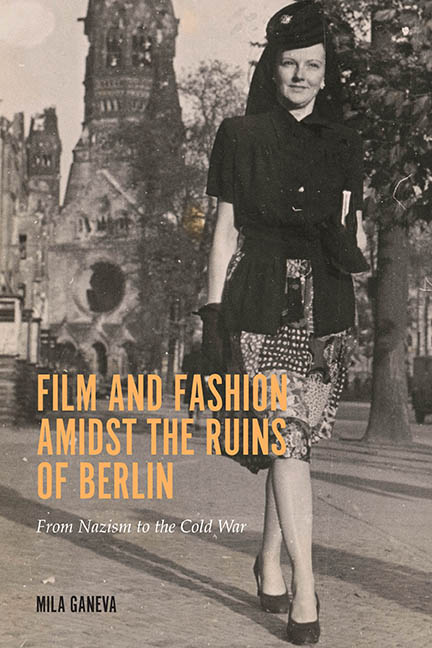Book contents
- Frontmatter
- Contents
- List of Illustrations
- Acknowledgments
- Introduction
- Chapter 1 Vicarious Consumption: Wartime Fashion in Film and the Press, 1939–44
- Chapter 2 “Fashions for Fräuleins”: The Rebirth of the Fashion Industry and Media in Berlin after 1945
- Vignette 1 Charlotte Glückstein: Historical Ruptures and Continuities in Postwar Fashion
- Chapter 3 Fashion amidst the Ruins: Revisiting Two Early Rubble Films,… und über uns der Himmel (1947) and Die Mörder sind unter uns (1946)
- Vignette 2 Hildegard Knef: Star Appeal from Fashion to Film
- Chapter 4 Farewell to the Rubble and Welcome to the New Look: Straßenbekanntschaft (1948) and Martina (1949)
- Chapter 5 Consuming Fashion on the Screens of the Early 1950s: Modell Bianka (1951), Frauenschicksale (1952), and Ingrid: Die Geschichte eines Fotomodells (1955)
- Epilogue
- Appendix 1 Principal Costume and Fashion Designers: Biographical Notes
- Appendix 2 Films and Newsreels Discussed
- Notes
- Bibliography
- Index
Chapter 4 - Farewell to the Rubble and Welcome to the New Look: Straßenbekanntschaft (1948) and Martina (1949)
Published online by Cambridge University Press: 28 July 2018
- Frontmatter
- Contents
- List of Illustrations
- Acknowledgments
- Introduction
- Chapter 1 Vicarious Consumption: Wartime Fashion in Film and the Press, 1939–44
- Chapter 2 “Fashions for Fräuleins”: The Rebirth of the Fashion Industry and Media in Berlin after 1945
- Vignette 1 Charlotte Glückstein: Historical Ruptures and Continuities in Postwar Fashion
- Chapter 3 Fashion amidst the Ruins: Revisiting Two Early Rubble Films,… und über uns der Himmel (1947) and Die Mörder sind unter uns (1946)
- Vignette 2 Hildegard Knef: Star Appeal from Fashion to Film
- Chapter 4 Farewell to the Rubble and Welcome to the New Look: Straßenbekanntschaft (1948) and Martina (1949)
- Chapter 5 Consuming Fashion on the Screens of the Early 1950s: Modell Bianka (1951), Frauenschicksale (1952), and Ingrid: Die Geschichte eines Fotomodells (1955)
- Epilogue
- Appendix 1 Principal Costume and Fashion Designers: Biographical Notes
- Appendix 2 Films and Newsreels Discussed
- Notes
- Bibliography
- Index
Summary
It feels good to encounter new faces and not old stars costumed and gotten up as rubble women.
—P.E., “Martina,” review, Weltbühne, no. 17, 1949Fashion in Berlin today is the way we don't dress.
—“Sommer in Berlin,” Mosaik, July–August 1948SOME OF THE THEMES ANNOUNCED in the first two postwar rubble films from the East and the West cast a long shadow over the films produced in subsequent years, especially in works that predominantly reflect the lives and struggles of young women. At the same time, films from the end of the 1940s show signs of departure from the aesthetics of the ruins and turn their interests in slightly new directions, toward depicting in detail the pleasures of material comfort and consumption. Whereas Die Mörder sind unter uns and … und über uns der Himmel feature women in supporting roles, highlighting their primary function of assisting—or sabotaging—men's traumatic return from the front to postwar normality, some later films, such as DEFA's Straßenbekanntschaft (1948, directed by Peter Pewas) and the West German Martina (1949, directed by Arthur Maria Rabenalt) focus exclusively on rebellious girls “hungry for life” (“lebenshungrige Mädchen”) as protagonists, caught between conventional familial allegiances and a strong eagerness to live independent lives. In both films, the young heroines at the center of the plot follow similar trajectories: Initially, the precarious postwar circumstances have pushed them into exploitative and criminal schemes; they end up providing sexual favors in exchange for food, fancy clothes, shelter, and security. Gradually, however, through a series of dramatic personal and institutional interventions, these young women's fates are turned around and their psychic and physical wounds are healed as they prepare for a much more stable life within a secure, domestic setting.
As has been common in the bifurcated German postwar film history, Straßenbekanntschaft and the lesser-known Martina have always been looked at separately. The primary focus has always been on how both works present somewhat predictable narrative paths of downfall and redemption and how their content is sometimes overtly didactic.
- Type
- Chapter
- Information
- Film and Fashion amidst the Ruins of BerlinFrom Nazism to the Cold War, pp. 121 - 144Publisher: Boydell & BrewerPrint publication year: 2018



